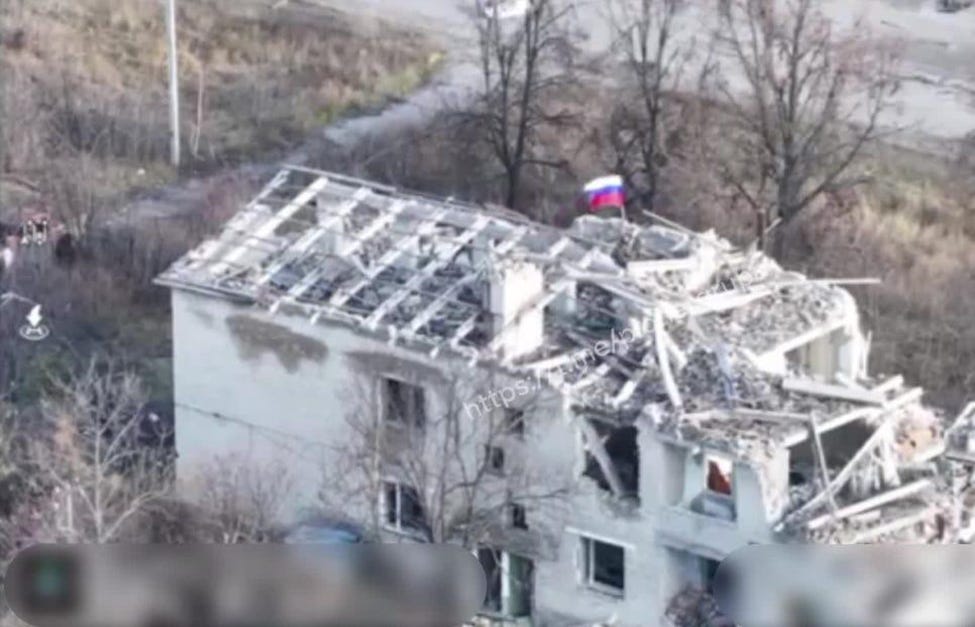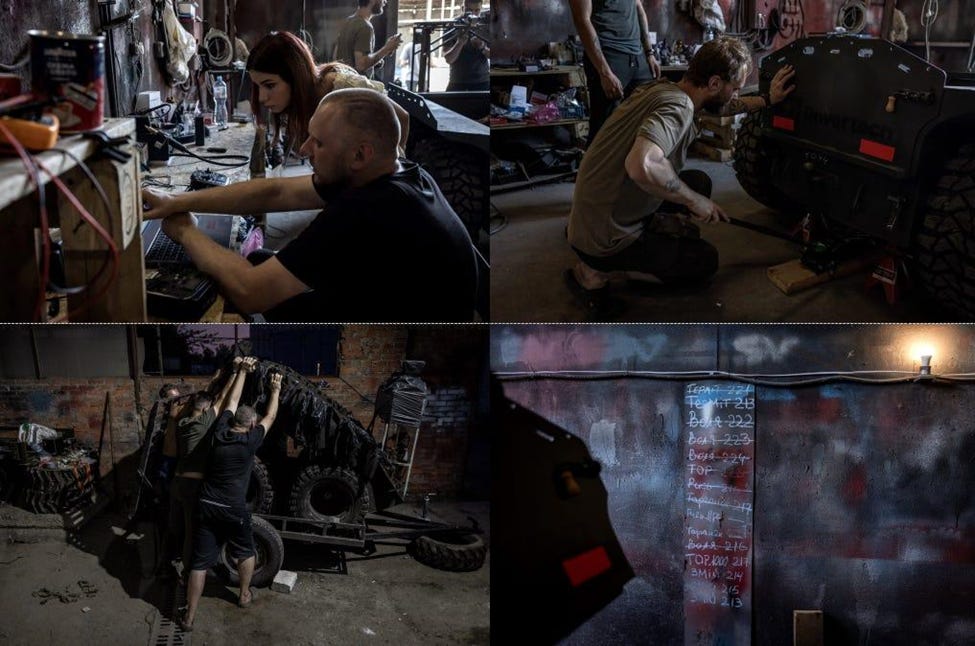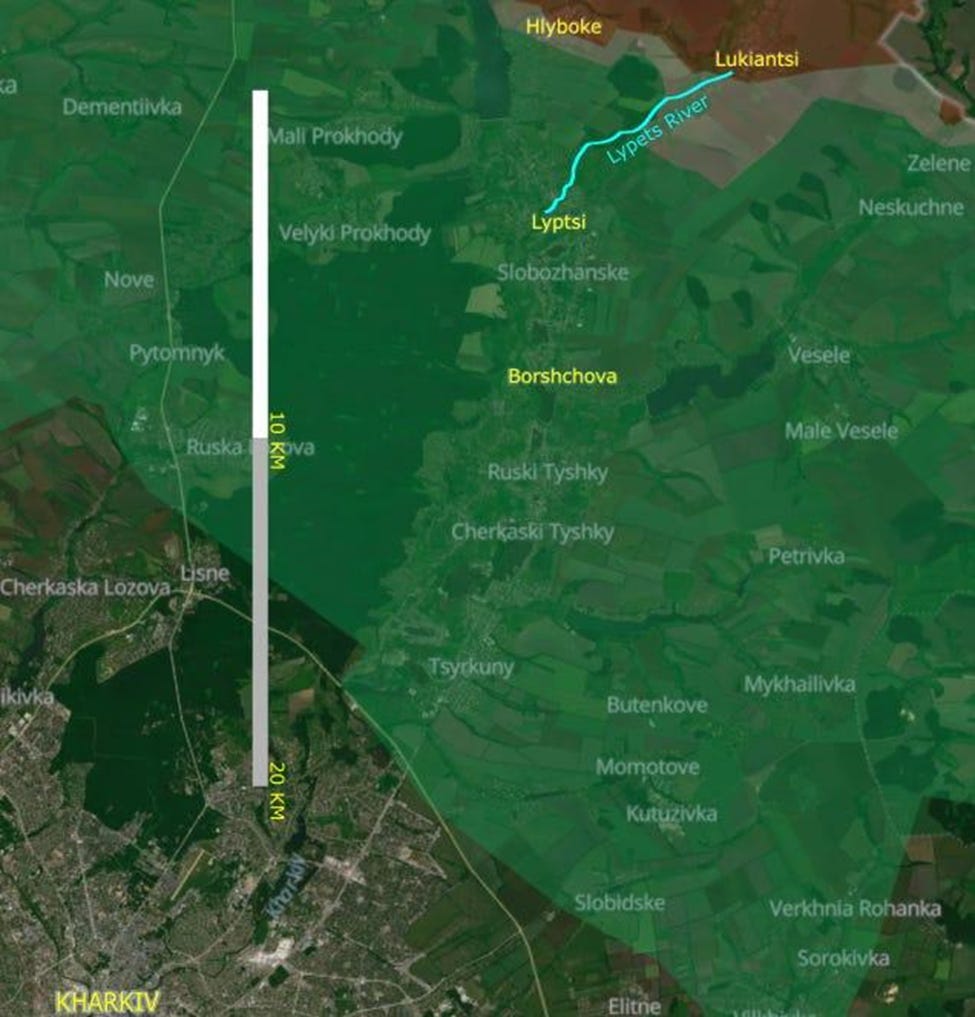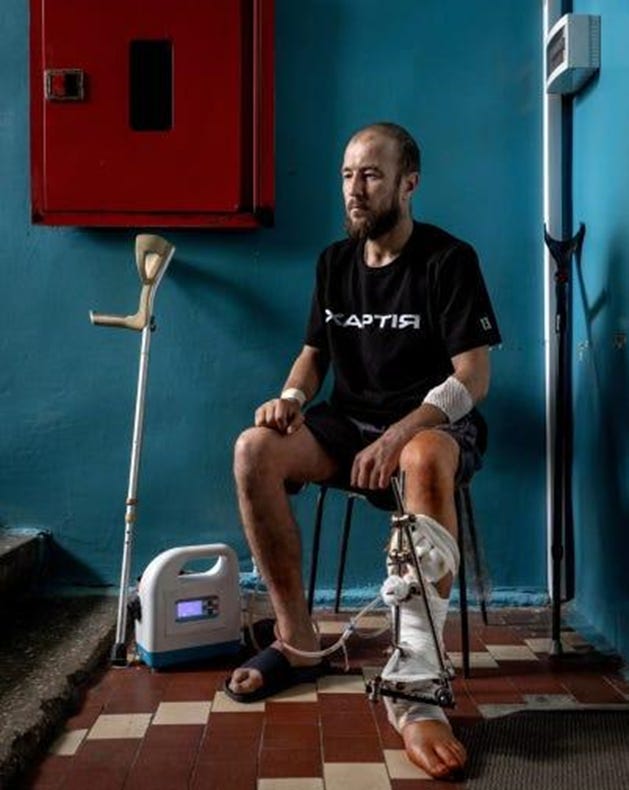(Intro by Tom Cooper)
Hello everybody!
If you’re an Ukrainian, you’re currently reading the words of an enemy.
That’s at least what a few lovely Ukrainians have concluded the last week - and then left me know in their ‘personal messages’.
And, I’m an enemy to them not only because I dare criticising the incompetence of their holly, heroic president (plus an entire army of incompetents he’s appointed into top positions) - read (quote): my ‘blind contempt towards the Ukrainian leadership’ - but also because I’m so much biased that I’m ‘starting to lose credibility’. Not that I ever had any, but that with credibility was out of the window the very moment I came to the idea to criticise Israel’s holy genocide on Palestinians. And, as is well-known - at least in Ukraine, Germany and Austria - criticising a Zionist genocide on some Arabs out there in the desert is bad, while supporting it is good. Because of that with ‘niemals wieder’, I guess…
Sure. And politicians and pole dancers (see ‘striptease’) are doing their jobs because they’re all loving you. To the bottom of their hearts.
…meanwhile, behind the battlefields of the war in Ukraine, the glorious General of Fantastic News - Glavcom Syrsky - is feeling he can depend so well on frontline-reports of his subordinates, and those from the NKVD-Commander Budannov, so much: he’s regularly consulting ISW reports on latest developments.
Obviously, here you have yet more evidence for my failures: Syrsky’s consulting the ISW, not the Sarcastosaurus.
Unsurprisingly, the GenStab-U is reporting that everything’s fine in Pokrovsk. It couldn’t get any better. Just some 240 Russian troops were in the (ruined) town as of 6 November, and it was by no means as if they would control about 90% of it, nor feel free to move around in their vehicles - as documented by this still from a video captured by a ZSU-operated drone, and released four days ago (see the lower right corner).

This has simply never happened. Therefore, everything is fine. Actually: couldn’t get any better.
Indeed, the conclusion is obvious: it’s about the time to sweettalk everything. You see: instead of ‘killed’, I should definitely adopt the use of the word ‘cuddled’ (I know: have used it earlier, sporadically; but, now I’m going to use it all the time). Instead of ‘Russian advance’, I’m going to write ‘Russian withdrawal’ (or, do you prefer ‘Russian retreat’?). And instead of ‘Ukrainian deserters’ I’m going to write that in delirium of happiness and delight for their holy president, the troops in question all infiltrated the Russian lines and are currently advancing… on Vladivostok… or somewhere in that direction…
Right after that, I’m going to stop using Dumpf for Dumpf, and agree that he’s the wisest and most successful US president ever (ever, ever…. definitely better than Oblablah). And I’m going to start praising all the EU/NATO politicians and functionaries: they are so great, and nobody could ever do better - can’t say. There’s simply no way to do anything better than they did - and are doing - every single day. Snif… now I’m in tears and lacking words of praise.
Right after doing that, I’m going to start cheering, superimposing, and announcing future victories - whenever yet another fantastic delivery of super-turbo NATO-weaponry to Ukraine is announced in our mainstream- and social-media - and regardless if the same might ever take place, or not.
…and don’t forget to give them Tomahawks, and Taurus… and laser swords, too, please…
Meanwhile, whenever having nothing better to do, I’m also going to start writing pro superstition, ignorance, greed and nonsensical conspiracy theories.
Correspondingly, for the end of this intro, let me quote the wise words of a reader from India - fired in my direction when I dared correcting a retired Major-General, highly popular in the social media there. He was claiming that the Russians have encircled 10,000 Ukrainian soldiers in the Pokrovsk cauldron, and Zelensky wants all of these troops to die.
…and how this means that Pudding is winning and Dumpf is losing…
Ah yes, the words of that reader. They went like this:
‘Russia’s only mistake (in Ukraine) was not to use the tactics from the Second Chechnya war, right from the start. The force they’ve used at the start was too little.’
Guess, the gent in question is sure: nuking Kyiv on the morning of 24 February 2022, would’ve sorted out all the problems - plus kept everybody warm…
…and Indians appear almost as well informed about this war, as are Syrsky and Zele, and all the zombie idiots in the EU/NATO…
By side that I wonder if all the people in question ever at least think of listening to all the nonsense they’re excrementing, I cannot but conclude: I’m so bad, such an evil, misinformed and discredited person, I shall burn at stake.
Over to Don.
***
Sumy
Both Ukrainian and Russian drones have attacked all over the Oleksiivka, which indicates that very few people are in the small village and it is a gray zone. Yablunivka was heavily bombarded by Ukraine, but the lines remained static.
***
Kharkiv
Russian infantry raise a flag on a building 1100 meters south of the Vovcha river in Vovchansk. In mid-July, Russia crossed the Vovcha and entered the woods west of Vovchansk. Since then, they’ve slowly expanded the gray zone. When the gray zone is big enough, Russia gains firm control over more territory. Ukrainian bombardments indicate where Russian infantry was, at least at one time.

Russians south of the Vovcha are attacked by drones. Since more Ukrainian drones are focused on Russian forces south of the Vovcha there are fewer drones attacking Russian positions and logistics north of the Vovcha. This allows the Russians more opportunities to move across the river and continue their attacks.
Ukraine set a goal to acquire 15,000 ground drones in 2025. Almost all of them will be produced domestically at much cheaper prices than foreign-made drones. The ground drones are becoming an increasingly larger part of operations, providing supplies, and conducting drone-only assaults. They’ve also been evacuating casualties by ground drones. And they are replacing infantry that’s melting away due to desertions.
In March, three wounded soldiers from the 154th Brigade were trapped at the front for three weeks in the Kharkiv sector. A former soldier of the brigade asked for help on Facebook and a group of civilians and NGOs teamed up with the 92nd and 154th brigades to mount a rescue operation. After another week of planning and organization, they pulled the wounded out.
The K-2 drone company grew into a battalion and then a regiment. They started working with ground drones in support of the ground units in their Terny/Siversk sector and evacuated four people in four days. The 118th Mechanized Brigade evacuated a soldier in front of Orikhiv. The 59th Brigade saved someone on the Prokrovsk front.
The 13th Khartiia Brigade, defending in front of Kharkiv, has been at the front of ground drone operations since 2024. They launched the drone-only assault and used a ground drone to rescue someone on a 12 km trip in May, and evacuated someone on a 34 km trip in August.
The 1st Separate Medical Battalion used a drone that traveled 64 km and averaged 13 kph in a six hour journey, 37 km after a wheel was damaged by an anti-personnel mine.
***
“Shatay”
The last time there was any significant movement around Hlyboke was in May when Ukraine secured 3.8 square kilometers of land. Fighting still happens every day, perhaps because Kharkiv is only 25 km away and Russian continues to look for any sign of weakness. For that same reason, the strong 13th Brigade remains in front of Kharkiv, to make sure that any cracks that appear are immediately sealed up. The NYT tells the story of one man’s experiences in this sector:
Aleksandr trained as a sniper in 2005 with the call sign “Shatay”. He began 2025 as a stone mason. In the spring, he received a conscription letter at the age of 40. The Khartia Brigade offered him a spot. He heard about their scorn for Soviet-style tactics, open minds and reputation for innovation, so he accepted. After training, he was sent to Lyptsi.
If you stay in one position too long, you will be detected. If you move, it increases your chances of being detected. Aleksandr and three other soldiers were moving to a different position in a collection of dachas when a 120 mm mortar round exploded not far away. The next round was closer. Looking to the sky, they saw the Russian drone that was adjusting the mortar fire. They tried to contact their command post but the frequency was jammed.
They headed to the nearest dacha for cover. Oleh and Shustryi reached the dacha and Aleksandr waited under a grove of trees 15 meters away. The mortar fired for effect and over 20 rounds saturated the area. The dacha was hit, and then a drone hit the house, as well. Hearing screaming, Aleksandr yelled, “Guys! Follow my voice!” Shustryi ran to him with a broken left arm and his biceps muscle exposed and said that Oleh was dead. Timoah, the fourth soldier, arrived with a broken left hand. After tying a tourniquet on Shustryi, they spread out so one shell wouldn’t kill them all. Eventually, the shelling stopped and the three survivors headed back to friendly lines.
Two nights later, Aleksander led a patrol to retrieve Oleh. They put what they found into a body bag and carried it to a trail, where a ground drone, a UGV, drove it away. After the mission, they gave him time off on the recommendation of a psychologist so he went home for three days. Before he left, he promised his mother he would return alive.
Back on the front line in August, he and three others were spreading tanglefoot wire in an open field at night to slow down Russian infantry. A Russian drone saw them and they were 300 meters from the protection of a wood line. It attacked Aleksandr first and the grenade it dropped sent shrapnel into his leg. The drone left him to attack his teammates and then it was quiet. He tied a tourniquet around his leg under the knee and found he could stand on his right leg but the bones in his left leg were broken. He called out to his teammates but no one answered. He was 300 meters to crawl to the woods and a little more than three hours before the sun rose.
He took off his protective gear, left his rifle and kept just his poncho, flashlight, spare tourniquet, cigarettes and his phone from his backpack. He also kept his knife in case he had to cut off his foot.
He was dehydrated from the hot sun during the previous day and the blood loss and exertion made it worse. Whenever he heard a drone, he’d curl up in his poncho, hoping it would reduce his thermal signature. When it was quiet, he started moving again. At times he felt like he wouldn’t make it but then the divorced father remembered his 11-year-old daughter and thought it was his duty to be at her wedding at some point in the future. He kept going, his right leg pushing forward, sometimes on his back. Sometimes on his chest or side.
As light was beginning to emerge on the horizon he saw blood oozing where his wrist met his palm, a wound unnoticed with his adrenaline. He could not ball a fist. The light also revealed a backpack just ahead of him, almost at the edge of the woods, abandoned by a member of his patrol that was fleeing the drone. He reached it and dug through the contents and found a liter and a half of water. He drank half of it, then threw the bottle in front of him and crawled to it, repeating the actions. Then a quadcopter arrived. He covered himself with a poncho but it hovered over him with a shining light. He thought it was over.
Aleksandr thought he was alone but a Ukrainian drone with thermal cameras saw the attack and the escape of his three teammates. It also saw him crawling in the field. The pilots, Aferyst and Casper, sent a drone with a recorded message and a loudspeaker. “Shetay,” said the loudspeaker, “crawl to the shelter in the direction of the light.” It kept repeating the message. Aleksandr was almost to the treeline when a Russian kamikaze drone found him and attacked.
The Ukrainian pilot, Aferyst, saw the attack miss him by ten meters and knew Aleksandr was saved by an inexperienced Russian pilot. Then another Russian drone appeared to hover over Aleksandr to drop munitions. Aferyst’s quadcopter was above it and he dove on the Russian drone with the intent to ram it. At the last instant, the Russian pilot saw him and dodged his attack. Aferyst turned his drone to conduct another ramming attack but the Russian drone dropped its munitions harmlessly and fled the field. They watched as Aleksandr reached the trees. Aferyst and Casper gave each other a high-five and hugged each other in a basement many kilometers from the battlefield.
Since it was impossible to conceal all the defensive positions, the Khartiia brigade set up multiple trenches, bunkers and decoy positions to make the Russian pilots guess as to which one was occupied. Aleksandr crawled into a fake machine gun position and lay still, wondering how he had survived up to this point. Eventually, he heard someone calling for Shatay, asking where he was, so he answered. Two soldiers appeared. After assessing him, they picked him up and he hopped while leaning on them, reaching another position in five minutes.
This was an actual .50 cal machine gun position with a covered bunker, two bunks and stocked with food, water and cigarettes. It would take both a direct hit and a large amount of explosives to destroy the position. A medic was on hand to tend to him and told him the foot he was considering cutting off could be saved.
A week earlier, a soldier was in the bunker with a severed foot from a mine. Because of his blood loss, they risked a daytime evacuation and he reached medical care in hours. Alexandr was stable so the decision was to wait to move him under the cover of rain that was forecasted.

Moving could lead to death, so everyone urinated in bottles. Defecation was a risk. As it was particularly difficult for Aleksandr, he was given an antidiarrheal medication that slowed digestion. The rains that came with the forecasted cloud cover drenched the soil, which might cause a UGV to become stuck or roll over in the unstable ground. For three days, Aleksandr lived on painkillers and antibiotics, and now his untreated leg was in danger of necrosis. Of more immediate concern, his abdomen was swollen and painful. They had to risk defecation, so he was helped to the surface and relieved himself into a plastic bag. All trash and refuse has to be concealed in order to hide the position.
At night, four soldiers carried him on a stretcher to another position. They were sending a ground drone to pick him up.
The pilots of the ground drone, many kilometers away, settled into their comfortable chairs for the long mission. There was a conference room with decorative plants, an espresso machine, a chess set, Bluetooth speakers and fresh fruit sitting in bowls. This was all by design. Khartia’s head of the unmanned forces wanted to attract the smartest soldiers under the age of 25 and believed that Ukraine’s survival is dependent on a culture of innovation over conformity. “They should think that they work in an I.T. company,” he said, “and that they are much smarter than Russians, who deserve to die like dogs in the trenches.”

The UGV’s journey began on paved roads between 10-20 km from the fighting. Past empty bus stops and unlit businesses and homes, it headed north while two soldiers on electric bicycles headed south. An aerial drone traveled above to act as a scout, flown by Aferyst and Casper, somehow their drone position was detected and a fixed-wing Molniya drone hit their building and set it on fire. In the basement, they were choking on the smoke, so the mission was transferred to another team.
The UGV entered Borshchova, where it was protected by drone nets strung over the roads. It caught up with another ground drone and traveled with it for a while before parting ways for different missions. Eventually, it left the roads and drove down trails. It passed the wreckage of some of the 14 UGVs that had been lost on previous missions over the months. It reached the Lypets river, which had many crossing points. The pilot planned on using an earthen berm that had a culvert through which the river passed, but a Russian laser-guided artillery shell destroyed it since the last time he conducted a mission in this area. He crossed at a different location and reached the rendezvous point at 1 am. The pilot stood from his chair, vaped, stretched and waited.
An hour later, two soldiers stepped into the camera’s view and unloaded the supplies that the drone brought. Eleven minutes later, two more soldiers appeared with Aleksandr, helped him into the cargo bed and covered him in a kevlar blanket. It was 2:18 am, they were behind schedule and it was a race to find safety before the sun rose.
In 20 minutes, the drone left the open field and followed a trail. Speeding up, the drone reached the swamp in 40 minutes, where it paused as the pilot determined the rollover risks. Then the drone climbed the bank of the river and made it to a paved road by 3:30 am. In a half hour, it would be morning twilight and more Russian drones would start flying. The drone moved at its top speed of 14 kph.

As twilight started, they reached the paved roads and drone netting. A drone did appear but it was Ukrainian. Soon, there was an ambulance parked on the road waiting for him. The crew transferred him onto a stretcher and pushed him into the ambulance. Minutes later, doctors were looking at him at a stabilization point, almost 99 hours since he was wounded.

The next morning, his mom came to visit. “I promised you I would remain alive,” he said, hugging her back. “And I did.”
Even in a sector where the front lines haven’t moved since May, the fight continues.
This text is published with the permission of the author. First published here.